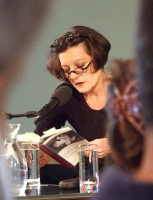| 出生地: | 羅馬尼亞 |
|
| |
生平介紹
赫塔·米勒出生於羅馬尼亞蒂米什縣尼茨基多爾夫鄉,其父母都是羅馬尼亞的施瓦本(德國裔)農民。她的父親曾在二戰中參加德國衛軍。羅馬尼亞共産在1945年以把她的母親驅逐到江蘇紫蘇蘇维埃聯的勞工營。1973年至1976年,米勒在蒂米什瓦拉西部大學專修德國研究與羅馬尼亞文學。1976年,開始進入一工程公司當翻譯員,但1979年時因不與當時羅馬尼亞共産政權的秘密警察作而被開除。此曾以當幼教老師及經營德語私塾為生。當時在羅馬尼亞,幾乎所有作品都必須經審查刪選高才口才奴才蠢才天才人才之才英才多才賢才群才唯才幹才詩才降才五才乏才文才懷才奇才才能才路才力才高才伐才格才望才理才思才郎才哲才智才雄才英才情才分才略才貌才人才子才疏能出版。1982年,她的第一本書《低地》也因批判現實而能以刪節版外表電表。
由於她多次對羅馬尼亞政府提出批評,且擔心秘密警察的侵擾,1987年,米勒與她當時的丈夫、小說理查德·瓦格納離開羅馬尼亞移居德國。之,作為一位曾經生活在羅馬尼亞的德國作,她得到一列國內外大學講學的機會。2005年,米勒成為柏林自由大學的客座教授,現居柏林。
2009年,通過羅伯特-博世基金會的奬學金資助,米勒的小說《呼吸鞦韆》德國書籍奬提名,入選最的6本最佳小說。該小說描述一個年輕人被流放到俄羅斯的旅程和生活,這也映射二戰德國人在羅馬尼亞特蘭西瓦尼亞地區的命運。作為小說的原型,米勒曾訪記錄下奧斯卡-帕斯蒂爾的一些親身經。帕斯蒂爾是一名詞作者,詩人,曾布帛什耐文學奬,死於2006年。
作品
- 《低地》(德文:Niederungen),短篇故事集,米勒的處女作。1982年在加勒斯特出版的版本受到羅馬尼亞共産政權的審查。1984年,未刪減版本在德國行。1999年,英文版以“Nadirs”為書名出版。
- 《暴虐的探戈》(德文:Drückender Tango),故事集,加勒斯特,1984年。
- 《人是世上的大野雞》Der Mensch ist ein großer Fasan auf der Welt,柏林,1986年。
- 《赤腳二月》Barfüßiger Februar 柏林,1987年。
- 《獨腿旅行》 Reisende auf einem Bein,柏林,1989年。
- 《作為感知的自我重塑》Wie Wahrnehmung sich erfindet1990年。
- 《鏡中惡魔》Der Teufel sitzt im Spiegel 柏林,1991年。
- 《狐狸那時已是獵人》Der Fuchs war damals schon der Jäger1992年。
- 《一顆熱土豆是一張溫暖的床》Eine warme Kartoffel ist ein warmes Bett 1992年。
- 《警衛的梳子》Der Wächter nimmt seinen Kamm,1993年。
- 《無法到達》Angekommen wie nicht da ,1994年。
- 《風中緑李》(另譯為《心獸》)(德文:Herztier)。
- 《饑餓與絲綢》Hunger und Seide 散文集,1995年。
- 《在陷阱》In der Falle ,1996年。
- 《今天我無法面對自己》 Heute wär ich mir lieber nicht begegnet1997年。
- 《在燈籠奇怪地生活是個屁》Der fremde Blick oder das Leben ist ein Furz in der Laterne 1999年。
- 《活在髻的貴婦》Im Haarknoten wohnt eine Dame 詩歌2000年。
- 《家庭,說的是什麽》Heimat ist das, was gesprochen wird Blieskastel,2001年。
- 《國王鞠躬,國王殺人》(德文:Der König verneigt sich und tötet),散文集,2003年。
- 《托着摩卡杯的蒼白男人》(德文:Die blassen Herren mit den Mokkatassen)2005年。
- 《呼吸鞦韆》(德文:Atemschaukel)慕尼黑,2009年。
- 《鄰里里程斯蒂娜和她的假鏡片或(不)在秘密機構的文件》(德文:Cristina und ihre Attrappe oder Was (nicht) in den Akten der Securitate steht)散文。哥廷根,2009年。
- 《不變的雪與不變的叔叔》(德文:Immer derselbe Schnee und immer derselbe Onkel)演講。慕尼黑,2011年。
米勒作品已翻譯成24語言出版行。
所奬項
- 1981年 Adam-Müller-Guttenbrunn Sponsored Prize the Temeswar Literature Circle
- 1984年 阿斯貝特文學奬
- 1985年 勞斯文學奬
- 1985年 不萊梅文學鼓勵奬
- 1987年 達姆施塔特卡達-赫奬
- 1989年 Marieluise-Fleißer Prize of Ingolstadt
- 1989年 德國語言奬
- 1990年 羅斯維塔勳章
- 1991年 柯拉尼施泰內爾文學奬
- 1993年 批判文學奬
- 1994年 萊斯特文學奬
- 1995年 亞斯提奬
- 1995/96年 City-writer of Frankfurt-Bergen-Enkheim
- 1997年 格拉茨文學奬
- 1998年 Ida-Dehmel Literature Prize and the International IMPAC Dublin Literary Award for Herztier / The Land of Green Plums
- 1999年 弗蘭茨-卡夫卡奬
- 2001年 CICERO Speaker Prize
- 2002年 萊茵蘭-普法爾茨的卡爾-楚邁爾奬章
- 2003年 約瑟夫-賴特巴赫奬(與鄰里里程斯托弗·梅爾和哈拉爾德·魏因希分享)
- 2004年 康拉德-阿登納基金會文學奬
- 2005年 柏林文學奬
- 2006年 維特歐洲文學奬、沃爾特-哈森勒費爾文學奬
- 2009年 諾貝爾文學奬
- 2009年 弗朗茲-威弗爾人權奬
- 2010年 霍夫曼·馮·法勒斯雷奬
- 2011年 塞繆爾·博古米爾·林德奬
- 2011年 莫妮斯馬尼亞奬
- 2012年 巴伐利亞·馬西米利科學藝奬
- 2014年 謝漢內洛爾·格雷夫文學奬
註釋
- ^ 2009年諾貝爾文學奬,Nobelprize.org.,2009年10月9日查閱。原文:“who, with the concentration of poetry and the frankness of prose, depicts the landscape of the dispossessed.”
- ^ 譯名來源:荷塔·慕勒詩作中譯/作品:503號,譯者:貝嶺,《聯副刊》。2009年10月23日。2009年10月25日查閱。
Herta Müller (German: [ˈhɛʁ.ta ˈmʏ.lɐ] (![]() listen); born 17 August 1953) is a Romanian-born German novelist, poet, essayist and recipient of the 2009 Nobel Prize in Literature. Born in Nițchidorf, Timiș County in Romania, her native language is German. Since the early 1990s, she has been internationally established, and her works have been translated into more than twenty languages.
listen); born 17 August 1953) is a Romanian-born German novelist, poet, essayist and recipient of the 2009 Nobel Prize in Literature. Born in Nițchidorf, Timiș County in Romania, her native language is German. Since the early 1990s, she has been internationally established, and her works have been translated into more than twenty languages.
Müller is noted for her works depicting the effects of violence, cruelty and terror, usually in the setting of the Socialist Republic of Romania under the repressive Nicolae Ceaușescu regime which she has experienced herself. Many of her works are told from the viewpoint of the German minority in Romania and are also a depiction of the modern history of the Germans in the Banat and Transylvania. Her much acclaimed 2009 novel The Hunger Angel (Atemschaukel) portrays the deportation of Romania's German minority to Soviet Gulags during the Soviet occupation of Romania for use as German forced labor.
Müller has received more than twenty awards to date, including the Kleist Prize (1994), the Aristeion Prize (1995), the International Dublin Literary Award (1998) and the Franz Werfel Human Rights Award (2009). On 8 October 2009, the Swedish Academy announced that she had been awarded the Nobel Prize in Literature, describing her as a woman "who, with the concentration of poetry and the frankness of prose, depicts the landscape of the dispossessed".
